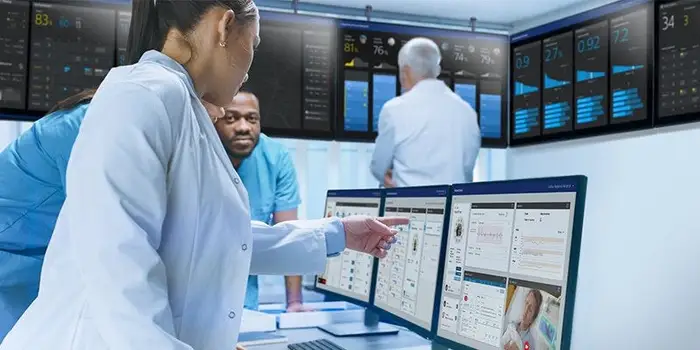Explore how medical centers, like the Johnson Medical Center are transforming patient care through cutting-edge technologies and personalized strategies. From remote monitoring tools to AI-driven diagnostics, these innovations are reshaping healthcare delivery. Discover how telemedicine is revolutionizing access to medical services, and precision medicine is tailoring treatments to individual needs. Patient-centric apps and portals are empowering individuals to take charge of their health journey. Stay tuned to uncover the latest advancements that are enhancing the patient experience and improving health outcomes.
Remote Monitoring Technologies
Remote monitoring technologies have revolutionized the way healthcare providers can track and manage their patients’ health remotely. Utilizing wearable devices equipped with sensors, healthcare professionals can now gather real-time data on essential signs, activity levels, and other key health indicators without the need for frequent in-person visits. These wearable devices, ranging from smartwatches to specialized medical-grade monitors, allow for continuous monitoring and early detection of any concerning trends.
Data analytics play a pivotal role in making sense of the vast amounts of information collected through remote monitoring. Advanced algorithms can analyze this data to provide insights into a patient’s health status, predict potential issues, and even suggest personalized interventions. By leveraging these analytics, healthcare providers can offer proactive care, tailored to each individual’s specific needs, ultimately leading to better health outcomes and improved patient satisfaction.
Incorporating wearable devices and data analytics into remote monitoring practices not only enhances the efficiency of healthcare delivery but also fosters a sense of connectedness and support for patients, empowering them to take an active role in managing their health.
AI-Powered Diagnostic Tools
Utilizing artificial intelligence (AI) technology in diagnostic tools has greatly advanced the capabilities of healthcare providers in accurately identifying and interpreting medical conditions. Machine learning algorithms embedded in AI-powered diagnostic tools enable automated diagnostics, allowing for faster and more precise analysis of patient data.
These tools can rapidly process vast amounts of medical information, including imaging scans, lab results, and patient histories, to aid in the early detection and diagnosis of various diseases.
Telemedicine and Virtual Consultations
Amidst the ever-changing landscape of healthcare, telemedicine and virtual consultations have emerged as pivotal tools in transforming the way patients receive medical care. Remote consultations offer patients the convenience of accessing healthcare services from the comfort of their homes, reducing the need for in-person visits.
Telehealth advancements have enabled healthcare providers to diagnose and treat patients remotely, expanding access to medical expertise regardless of geographical limitations.
Virtual consultations allow patients to connect with healthcare professionals through secure video conferencing, facilitating timely assessments and personalized care plans. These innovative approaches not only improve patient satisfaction but also enhance the efficiency of healthcare delivery systems.
By leveraging telemedicine technologies, medical centers can streamline consultations, reduce waiting times, and optimize resource allocation.
Embracing remote consultations and telehealth advancements not only enhances patient care but also empowers individuals to take responsibility for their health proactively. As the healthcare industry continues to evolve, integrating telemedicine into standard practice guarantees that patients receive high-quality care conveniently and efficiently.
Precision Medicine Approaches
Embracing the principles of precision medicine revolutionizes patient care by tailoring treatment strategies to individual genetic, environmental, and lifestyle factors. Through genetic testing, medical professionals can gain insights into a patient’s unique genetic makeup, allowing for personalized treatment plans that are more effective and targeted. By analyzing genetic information, healthcare providers can determine the most suitable medications, dosages, and interventions based on an individual’s genetic predispositions, minimizing adverse reactions and enhancing treatment outcomes.
Genetic testing plays a pivotal role in identifying genetic variations that may influence how a person responds to specific treatments, making precision medicine an invaluable approach in healthcare. The personalized treatment approach considers not only a patient’s genetic profile but also environmental and lifestyle factors that can impact health and wellness. By integrating these different elements, healthcare providers can offer tailored interventions that address the specific needs of each patient, leading to more successful outcomes and improved overall well-being.
Patient-Centered Apps and Portals
Patient-centered apps and portals have become integral tools in modern healthcare, facilitating enhanced communication and engagement between patients and healthcare providers. These digital platforms empower patients by providing access to personalized care plans, appointment scheduling, medication reminders, and secure messaging with their healthcare team. By utilizing patient-centered apps and portals, individuals can actively participate in their healthcare journey, leading to improved health outcomes and a sense of empowerment.
Personalized care is at the forefront of these digital tools, allowing patients to receive tailored information and resources based on their specific health needs and preferences. Through seamless digital communication, patients can easily reach out to their healthcare providers, ask questions, and receive timely responses, promoting a collaborative relationship between both parties.
Incorporating patient-centered apps and portals into healthcare practices not only enhances patient engagement but also streamlines communication, leading to more efficient and effective care delivery. Embracing these technological innovations fosters a patient-centered approach that prioritizes individualized care and continuous support throughout the healthcare experience.
